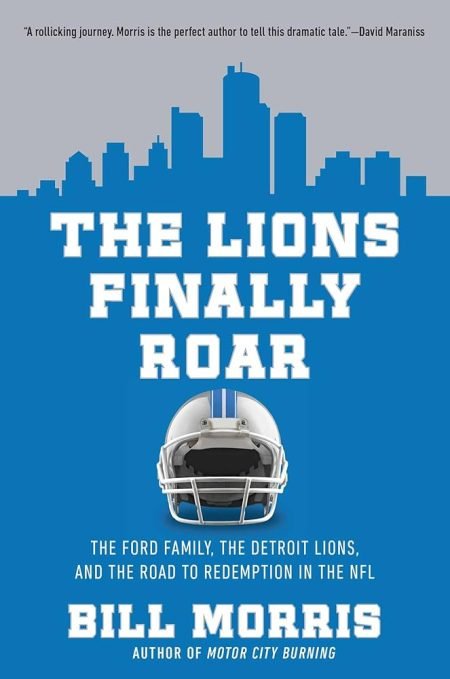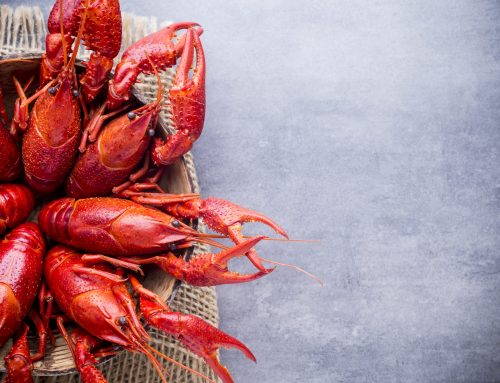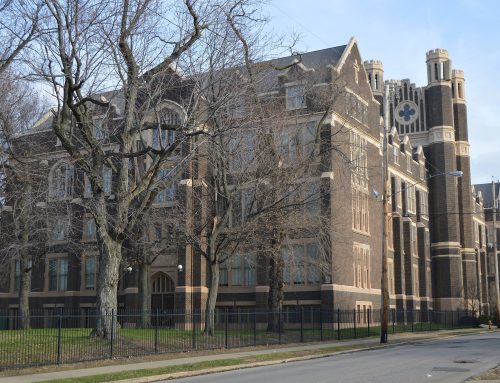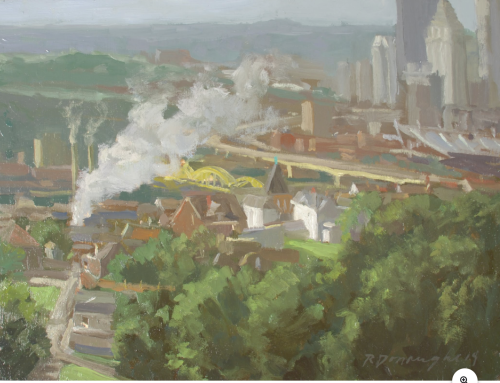It isn’t the last time Bill Ford will celebrate a little too much after a Detroit Lions’ game. But it is the last time in his long life he will celebrate them winning a championship.
By Bill Morris
The following is an excerpt from The Lions Finally Roar: The Ford Family, the Detroit Lions and the Road to Redemption in the NFL by Bill Morris and released by Pegasus Books.

It’s noon on Sunday, Dec. 29, 1957. Briggs Stadium, the big sooty iceberg at the corner of Michigan and Trumbull just west of downtown Detroit, is already buzzing even though kickoff is still an hour away. The teams have just come out of their locker rooms to warm up — the hometown Lions in their Honolulu-blue jerseys and unadorned silver helmets and pants, the visiting Cleveland Browns all in white except for the orange globes of their helmets, an incongruous suggestion of sunshine and citrus on a team from that gray factory town where the combustible Cuyahoga River discharges its toxins into Lake Erie.
The winner of today’s game will be champions of the National Football League.
The two teams are old familiars. The Lions beat the Browns to win championships in 1952 and ’53 before losing to them, badly, in ’54. Now, as the players do calisthenics and run pass routes and boot balls high into the sky, puffs of steam shoot from their mouths. The temperature is hovering above freezing — nearly balmy by end-of-year Midwestern standards, when football games are often played on fields that have turned to viscous soup or frozen solid as a sidewalk. Today there will be no rain or sleet or snow. The field is dry, the winter grass patchy in spots, and the sun keeps peeking through a tattered cover of clouds. Even so, this is one of the shortest days of the year, and the banks of blazing lights that rim the stadium have already been turned on.
Among the 55,263 fans squeezed into the stadium on this day is a dapper man who prowls the press box like a caged puma. This is a roofed aerie atop the second deck that curls around the corner of the stadium where home plate stands in the summertime, a reminder that Briggs Stadium was built for baseball, not football — for Tigers, not Lions. From up here you look almost straight down at the field, a dizzying bird’s-eye view. The man pacing the press box stands apart from the blue-collar fans packing the seats beneath him. Instead of a nylon parka he wears a sleek camel hair overcoat and a cashmere scarf. There is no grease on the fingernails inside his leather gloves. A fedora rests atop his perfectly watered dark hair. He has been a Lions’ fan since he was a boy, and a year ago he bought into the 144-member syndicate that owns the team. Today, for the first time, he’ll find out how it feels to have skin in the game when a championship is on the line.
This is thirty-two-year-old William Clay Ford, the youngest grandson of auto pioneer Henry Ford, a man who was minted a multimillionaire the day he was born and has become richer, almost effortlessly, every day of his life. Now his personal wealth is beyond imagining, a hundred million dollars — a billion in today’s money — maybe more, maybe much more.
Ford stops pacing the press box and picks up a pair of binoculars so he can get a closer look at the activity on the field. His gaze lands on a man with a shock of yellow hair who’s dressed in street clothes and sitting on a bench beside a pair of crutches. The man’s right ankle is encased in a plaster cast. This is Bobby Layne, the Lions’ star quarterback, a hell-raising Texan whose ankle was shattered during a late-season win over these same Cleveland Browns. Losing Layne was typical of the adversity that has dogged this team since training camp. Buddy Parker, the coach who led the team to those back-to-back championships in 1952 and ’53, walked off the job in disgust just before the ’57 season began. “This,” he declared, “is the worst team in training camp I have ever seen — no life, no go. It’s a completely dead team.”
One of Parker’s assistants, mild-mannered, untested George Wilson, had stepped into the coaching vacancy. Then, during training camp, Layne got charged with drunken driving. He got off because the arresting officer, suddenly finding himself in an uncomfortably hot spotlight, decided that, well yes, come to think of it, he might have confused Layne’s Texas drawl with the slurred speech of a man who’d had a few too many — a suggestion put forward by Layne’s inventive defense lawyer. After the charges were dropped, the team’s trainer posted a sign in the locker room: “Ah ain’t drunk. Ah’m from Texas.” Everyone thought that was very funny.
Including Bill Ford, who is no stranger to sliding behind the wheel of a car after a few pops. He finds himself drawn to these rowdy, rough, nearly unmanageable football players, especially Layne. Their go-to-hell attitude is so refreshing compared to the bean counters and brown-nosers you run into in the shiny new headquarters of Ford Motor Company, that icy palace known as the Glass House.
Now Ford’s binoculars come to rest on Tobin Rote, Layne’s backup, who’s firing warm-up passes, grinning, chattering with coaches. Rote, another Texan, is a guy with a rifle arm who loves to run over defenders, and he looks relaxed out there, confident, almost cocky. Rote’s aura chases away some of Ford’s anxiety over Layne’s injury. The Lions acquired Rote from the Green Bay Packers before the season in case something happened to Layne, and Rote has proved to be an invaluable insurance policy. After Layne’s injury, Rote came off the bench and cemented the victory over the Browns, then he brought the team back from a 10-point halftime deficit to beat the Chicago Bears in the regular season finale, followed by another comeback win over the San Francisco 49ers in the Western Conference playoff, a game made necessary by the two teams’ identical 8-4 records in the regular season. And so here the Lions are in the league championship game, riding a four-game winning streak but battered, tired and stretched thin, clear underdogs to the well-rested and dangerous Browns.
Watching Tobin Rote throw his warm-up tosses gives Bill Ford a warm feeling. The warmth increases when he notices his wife Martha — Martha Firestone, the rubber heiress from Akron — sitting there in her mink coat with the other Grosse Pointe wives, sipping a cup of hot chocolate, trying to get their daughters, nine-year-old Muffy and six-year-old Sheila, to quit darting around like a couple of deranged minnows. Infant son Billy is at home, but soon enough he’ll join these Sunday family pilgrimages. Bill Ford feels lucky. Martha married him for love not for money, and she understands the hell he went through with the Continental Mark II. Martha is in his corner, and she isn’t coming out.
It’s time, at last, for the kickoff. The Lions’ kicker blasts the ball through the Cleveland end zone for a touchback, an omen of things to come. From there the game unfolds like a waking dream. The Lions score the first three times they touch the ball, and by the end of the first quarter they hold a 17-0 lead. It doesn’t seem quite real to Bill Ford and a lot of other people in the stadium. After Cleveland’s Jim Brown, the Rookie of the Year, runs for a touchdown to keep the game within reach, the Lions fake a field goal and Rote lofts a touchdown pass to a wide-open receiver. The Browns are stunned. Then comes the back breaker.
Just before halftime, Detroit’s defensive back Terry Barr snatches an interception at the Cleveland 19-yard line and scampers untouched into the end zone for a touchdown — a dagger that makes the score 31-7. After he crosses the goal line, Barr simply flips the ball to the referee and jogs back to the bench, tapping hands with teammates coming onto the field for the extra-point kick. Barr doesn’t slam the ball into the turf, or do a dance, or run toward the nearest camera, or leap into the air while bumping his teammates’ helmets and chests. Why would he? He has simply done what he’s expected to do, what he’s paid to do. The message behind the subdued behavior of Barr and his teammates is clear: in 1957, sports have not yet devolved into just another branch of American showbiz.
Late in the fourth quarter, with dusk descending and the outcome decided, Bill Ford scans the crowd. He’s hoarse from yelling. For the first time he tastes the iron in the breeze coming off the nearby river. As the clock ticks down, he realizes that everyone is standing, bouncing up and down — the whole building is shaking. A couple of jokers in the faraway centerfield bleachers have stripped off their shirts and they’re dancing in the aisles, no doubt fueled by repeat doses of Stroh’s beer and some antifreeze with a stronger kick. Bill Ford realizes he is witnessing delirium.
The final score is an astonishment: Lions 59, Browns 14. Tobin Rote has passed for four touchdowns and run for another. Though no one knows it, Rote’s performance will stand as the pinnacle of his seventeen-year career, much as this day will stand as the last hurrah for the Detroit Lions, who are about to embark on six and half decades of unrelenting futility. But that’s the future. Now fans are streaming onto the field as the players carry Joe Schmidt, Detroit’s star linebacker and co-captain, around on their shoulders. Fans join in the scrum. A city’s delirium is turning into pandemonium.
It has seeped into the locker room by the time Bill Ford pushes his way through the cigar smoke and champagne spray and bear hugs. He’d gotten word that Joe Schmidt and his roommate, the defensive lineman Gene Cronin, planned to throw a post-game party, win or lose. After congratulating Cronin, Ford says, “I hear you and Joe are having a party.”
“Yeah,” Cronin says uneasily, not sure where this is going.
Ford surprises him. “Can Martha and I come?”
Cronin is in just his second season in Detroit, but that’s long enough to figure out that you don’t say no to a member of the syndicate that owns the team, especially if his name is Ford. Cronin gives him directions.
Driving to the party in his Continental Mark II with the heater roaring to chase away Martha’s chill, Bill Ford realizes that what he loves about this day — what he loves about this game and this team and its fans — is that it all happens inside the chalked lines of the playing field, an orderly, violent, thrilling world that exists outside the suffocating world he grew up in and is expected to remain in forever, playing by its rigid rules, locked inside the walls of the Ford family fortune and the Ford Motor Company but relegated now to a decorative role, a man without real power. The Kid, an afterthought, just like his father. But what Bill Ford witnessed inside Briggs Stadium today might be a chance to step away from the family and the company, a chance to be emperor of his own world. As he pulls up in front of Schmidt’s and Cronin’s apartment, the idea might come to Bill Ford almost as an epiphany, unassailable, the perfect way out of his cage: I should buy the Detroit Lions.
The party is already at full roar, and Bill Ford dives right in. “So he and Martha showed up,” Cronin said later, “and at the end of the night they had to carry him out.”
It isn’t the last time Bill Ford will celebrate a little too much after a Detroit Lions’ game. But it is the last time in his long life he will celebrate them winning a championship.
Bill Morris is the author of the novels Motor City and Motor City Burning, along with the family memoir The Age of Astonishment, available from Pegasus Books. He is currently a staff writer with the online literary magazine the Millions, and his writing has appeared in Granta, the New York Times, the Washington Post Magazine, LA Weekly, Popular Mechanics, The Daily Beast,and numerous other newspapers and magazines. Bill grew up in Detroit and now lives in New York City.






